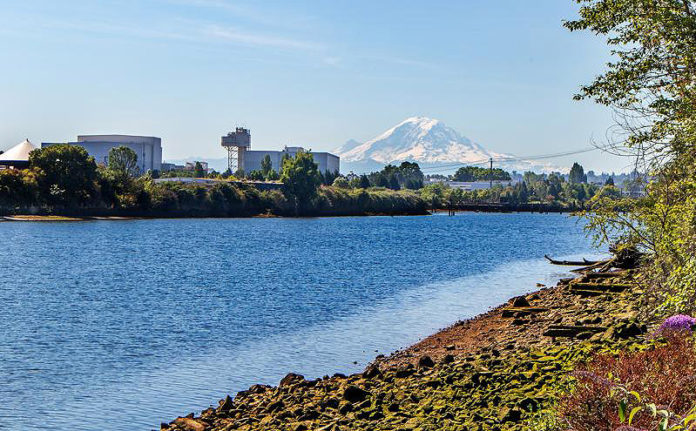SEATTLE, WA – The Elliott Bay Trustees have settled with General Recycling of Washington and its affiliates – Nucor Steel Seattle and the David J. Joseph Company – related to natural resource injuries caused by hazardous contaminants released into Seattle’s Lower Duwamish River.
The Elliott Bay Trustees include the United States, on behalf of the National Oceanic and Atmospheric Administration (NOAA); the Department of the Interior represented by the U.S. Fish & Wildlife Service; the State of Washington, on behalf of the Department of Ecology and Department of Fish and Wildlife; the Muckleshoot Indian Tribe; and the Suquamish Indian Tribe of the Port Madison Reservation.
As part of the settlement, the companies will construct and maintain a habitat restoration project at the General Recycling facility located on the west bank of the Lower Duwamish River. It will provide nearly three acres of off-channel habitat for fish and other wildlife and natural resources injured by contamination. The habitat will provide refuge areas and food sources for wildlife and various fish species, including juvenile salmon migrating from upriver spawning areas.
The settlement also requires the companies to reimburse a proportion of costs incurred by the trustees to assess natural resource damages in the river totaling more than $360,000. The settlement and project resolve claims alleged under federal and state laws for natural resource damages stemming from releases of oil and hazardous substances from the General Recycling facility.
“This settlement will provide critically needed habitat in the Lower Duwamish River that will provide significant benefits to important natural resources in the region,” said Assistant Attorney General Todd Kim of the Justice Department’s Environment and Natural Resources Division.
“NOAA is pleased to join this agreement with our co-trustees, private partners and industry to help restore vital habitats, fisheries and wildlife injured by pollution at this site,” said Assistant Administrator Nicole LeBoeuf for NOAA’s National Ocean Service. “Clean and productive waterways are vital to tribal and local communities for their cultural and economic well-being and this restoration will especially benefit those who have been disproportionately impacted by pollution.”
“This agreement marks an important step towards restoration of salmon habitat in the Duwamish River, which is essential for the recovery of salmon species and for the exercise of the treaty fishing rights of the Suquamish people as guaranteed by the 1855 Treaty of Point Elliott,” said Chairman Leonard Forsman of the Suquamish Tribe. “The Salish Sea, and the marine life that depend on it, are precious resources to the Suquamish people. We look forward to continued progress in reversing the damage done by years of pollution and destructive land use. With this settlement, and more that are on the way, we are beginning to see what restoration of habitat looks like, and that means strengthening our treaty fishery and our way of life.”
The Elliott Bay Trustees developed a Draft Restoration Plan and Environmental Assessment (RP/EA) analyzing the environmental benefits and impacts of the project, which is also subject to a 30-day comment period.
This settlement is part of a series of early settlements with polluting parties for natural resource damages in the Lower Duwamish River.















































